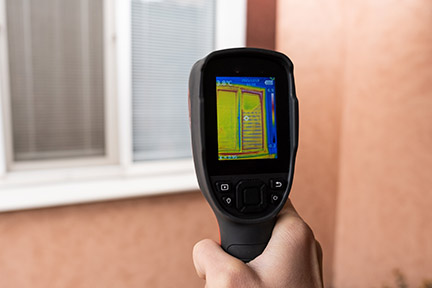Benefits
Before upgrading your heating and cooling system to a heat pump, consider weatherizing your home and making upgrades to your electric panel to help your equipment perform better and last longer. The completion of weatherization recommendations made during your Home Energy SolutionsSM assessment and service are a requirement to access rebates*.
• Increased comfort by reducing drafts and uneven temperatures
• Reduced home energy consumption
• Reduced home's greenhouse gas emissions
• Reduced heating and cooling load**
*Account holder must be a residential electric customer of Eversource or United Illuminating. Insulation Requirements: Must satisfy recommendations made during a Home Energy Solutions assessment and service. Must be complete within 12 months prior to your heat pump installation or 6 months post-installation. Please note that the rebate payment will not be sent until all work is complete. Heat Pump Requirements: Heat pump must be listed on the Energize CT Heat Pump Qualified Product List and must be installed by a contractor participating in the Energize CT Heat Pump Installer Network. Must be installed between January 1, 2024 – December 31, 2024. Must replace existing oil, propane, natural gas or electric baseboard as the primary heating system. Weatherization Bonus Requirement: Project must include the installation of both an eligible heat pump and insulation measures.
** A heat pump is an electrical system, so running one will add to your electrical use. In many cases, that additional electrical use is offset by savings elsewhere, such as a propane or oil heating fuel bill. If you’re adding a heat pump where there was no cooling source before, it will increase your electrical use.
Incentives & Financing
Single-Family
INCENTIVES
- Up to $1.70 per square foot on approved insulation recommendations
- Up to $2,750 for advanced duct sealing for qualifying systems
- Up to $15,000 for qualifying air source heat pumps
- Up to $15,000 for qualifying ground source heat pumps
- $500 Bonus Rebate when you weatherize and install a heat pump
- Federal tax credits may be available. Learn more about the IRA tax credits here or speak to your tax preparer.
FINANCING
Commercial
INCENTIVES
- Attic Insulation $0.035 sq. ft.
- Wall Insulation $0.145 sq. ft.
- $80 per hour of air sealing
- Up to $1,500 per ton combined incentives for air source heat pumps
Up to $4,000 per ton for qualifying ground source heat pumps
FINANCING
Information & Tips
Heat pumps installed in a properly weatherized home can significantly improve your comfort. A properly air sealed and insulated home will not only save money on operating costs and reduce carbon emissions throughout the year - it may also allow you to buy smaller, less expensive equipment.

Ensure there are as few gaps as possible for indoor air to escape and outdoor air to get in. Air leakage can represent up to 40% of space-conditioning costs in a leaky building.
Adding insulation slows heat transfer through the building envelope (i.e., walls, roof, floors); heat transfer is the leading cause of heat loss in the winter.
If your home utilizes a centralized heating or cooling unit with ducts outside of the conditioned space of the home (i.e., in an attic, basement, garage, or crawlspace), sealing and insulating the ducts can significantly improve the overall efficiency of your system by ensuring that more of the heated or cooled air gets delivered where it is needed.
If your home utilizes fuses or no longer has room in the electric panel (all slots in panel occupied), upgrades may be needed to install a high efficiency electric system for your home. Consult a licensed and insured electrician as necessary.
Air source heat pumps pull heat from the air outside and distribute it inside during winter. In summer, this process reverses to provide cooling. They come in ducted and ductless options:
- Ducted systems: Ideal for homes with existing ducts or plans to install them
- Ductless systems (mini-splits): Suitable for homes without ductwork and can be mounted on walls, floors or ceilings
Ground source (geothermal) heat pumps pull heat from the ground and distribute it inside during cold weather. During warmer months, this process reverses to provide cooling. This system is the most efficient type of heat pump and a great option for properties with sufficient outdoor space to accommodate the system.




